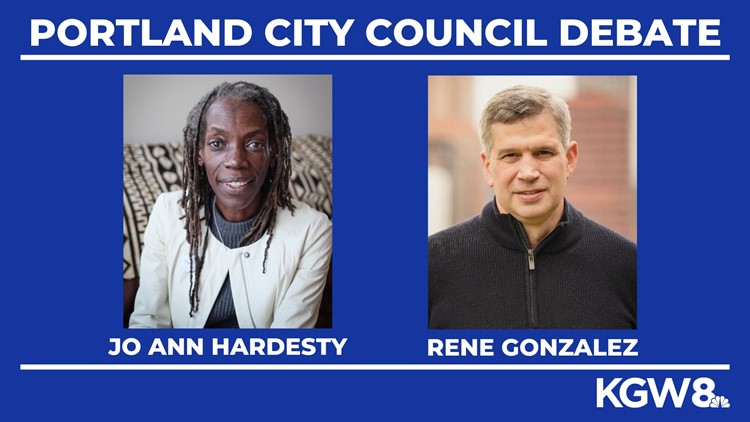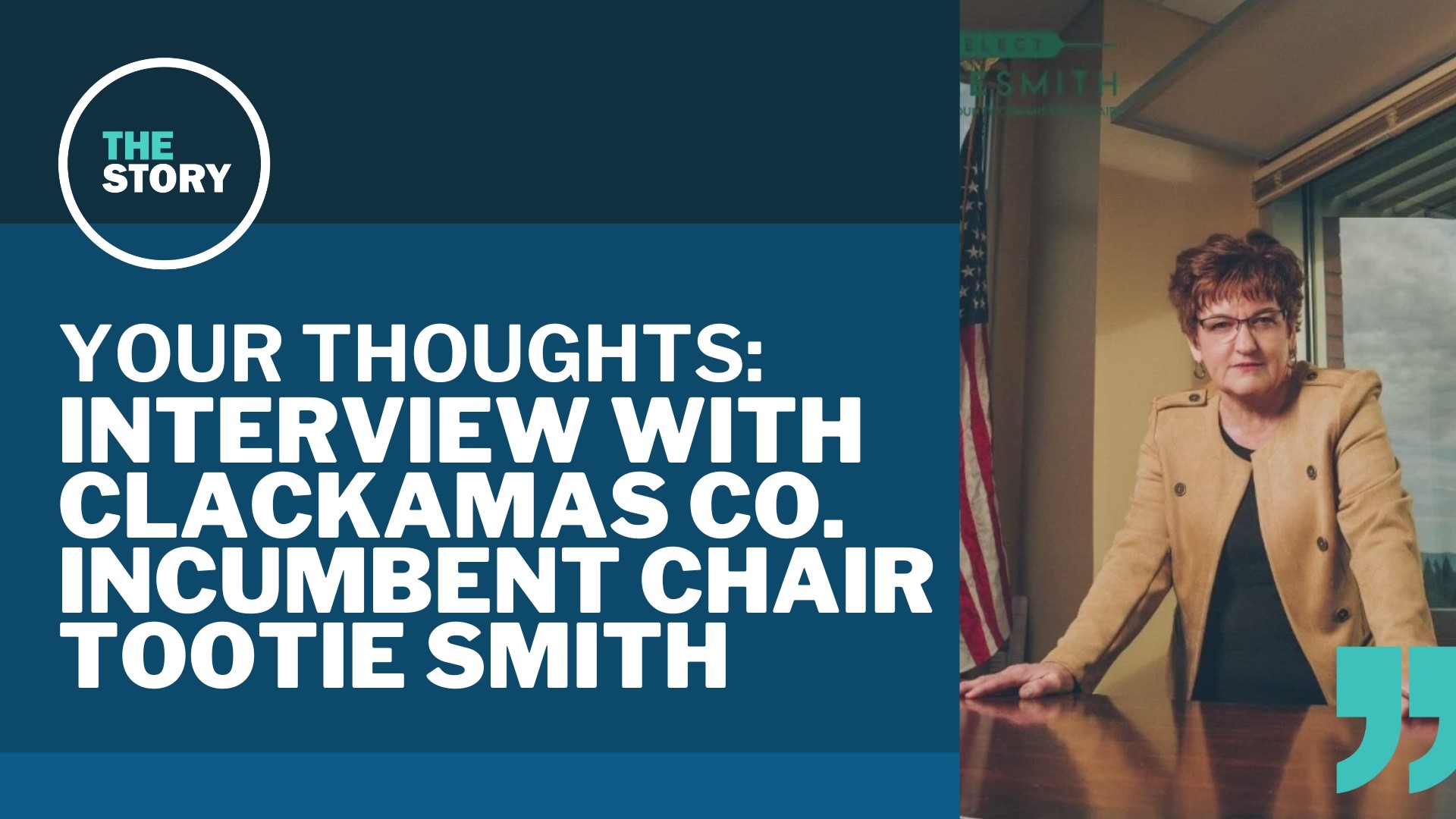PORTLAND, Ore. — Incumbent Portland City Commissioner Jo Ann Hardesty and challenger Rene Gonzalez faced off in a debate Friday afternoon, hosted by the City Club of Portland and moderated by KGW's David Molko.
Hardesty, a navy veteran and civil rights leader, was elected in 2018 and became the first Black woman to serve on the Portland City Council.
Gonzalez, a technology business owner and lawyer, was one of 10 opponents who challenged her in the primary election in May.
Hardesty finished first in the primary with 43.7%, falling short of the 50% threshold to win outright and setting up a November runoff against Gonzalez, who finished second after narrowly edging out another prominent candidate, Vadim Mozyrsky, 23.2% to 22.2%.
The winner of the November runoff will be elected to a four year term on the council starting in January.
Watch the full debate:
Police and public safety
The debate focused heavily on issues of crime and homelessness, particularly in Portland's downtown, with both candidates offering a fairly grim assessment of how the city has fared over the past few years. There were also some clashes, particularly on police and criminal justice issues.
Gonzalez criticized the city for making a $15 million cut to the Portland Police Bureau's budget "at the height of strife created during the pandemic," and said the city — including through "the rhetoric coming out of downtown, city hall" — had created an environment that makes it difficult to attract and retain officers.
Hardesty pushed back, arguing that the cuts took funding from "ineffective programs," and noting that no police officers lost their jobs and the department currently has funding for more officer positions than it has been able to fill.
When asked about how to address general feelings of lawlessness and a lack of safety among Portlanders, Gonzalez called for greater police funding and a crackdown on the drug trade, and he also brought up the idea of establishing a municipal court for Portland that could prosecute misdemeanors.
Hardesty highlighted a recent PBOT project in Mt. Scott-Arleta that she said reduced the number of shootings in the area, and she also called for the continued expansion of community safety programs like Portland Street Response and Public Safety Support Specialists with the police bureau.
"When you send a mental health professional to a mental health call, you get better outcomes," she said.
Housing, homelessness and downtown
When the debate turned to housing and homelessness issues, Hardesty called for the city, Multnomah County and Metro to all work to make unused land available for camps, citing the Right To Dream Too camp's former Old Town location as an example how sanctioned camps can improve public safety.
Gonzalez said the city should be considering larger shelters as an option, and he called for greater enforcement against individuals committing crimes in camps, as well as those who refuse to leave camps when shelter space is available, although he acknowledged a need to address the concerns of campers who are reluctant to move.
"[If there is a place to go], you've got to go to a shelter, or you're going to face the criminal justice system," he said, "and at the same time, we look to evaluate the legitimate concerns that folks have about those shelters, and we continue to improve the offerings."
On the issue of how often city employees should be required to work downtown as workplaces switch back from pandemic work-from-home models, Hardesty said she expected the city to stick with a "hybrid" model for its staff, likely requiring two or three days of in-office work per week.
Some city staff such as firefighters have never been able to work from home, she added, but for some other positions she said the pandemic illustrated how much of the job could be done remotely — an idea that Gonzalez attacked, arguing that city commissioners and their top aides should be in city hall every day.
Measure 110 and addiction treatment
Hardesty and Gonzalez both expressed criticism of the rollout of Measure 110, arguing that the addiction treatment programs and services promised by the measure have not been put into place alongside the drug decriminalization.
But when asked, they also both acknowledged that they had voted for the measure, and each said that they would not favor repealing it without first establishing all the treatment programs and evaluating how well the fully-implemented measure works.
Gonzalez put a greater emphasis on the criminal prosecution side, arguing at another point in the debate that "somewhere along the way, in Measure 110, in the dialog around it, it became implicitly ok to sell drugs; that you were also not responsible for the behaviors you engage in when you use hard drugs."
RELATED: Ryan appears to win re-election to Portland City Council; Hardesty faces runoff in November
When asked how they would tackle the availability of addiction treatment options, they both said the city is limited in how much it can do on its own, and that it would be critical to push for county and state-level action — although Gonzalez again argued that the city could help disrupt the hard drug trade with tougher enforcement.
There were a few other areas of agreement or at overlap between the two participants' answers, such as when they were asked to describe, in as few words as possible, how they felt walking around downtown. Gonzalez said "still happy" and Hardesty said "cautiously optimistic."
Finances and charter reform
Each candidate was also asked about a personal financial issue. In Hardesty's case, it was a court judgement over her reported $16,000 in credit card debt, which made headlines in April.
She replied that the debt was left over from her first city council campaign, which she funded in part using multiple credit cards, but she said the card with the $16,000 was "the one that was left" and that she is making payments on it.
Gonzalez was asked about the $77,000 fine leveled against his campaign earlier this month for receiving a heavily discounted lease rate for its downtown offices in violation of the rules of the city's Small Donor Elections program.
He replied that his campaign and the city had "a technical disagreement, not a philosophical one" about interpreting the regulations. He said he planned to appeal the fine and would pursue an outside review if he lost, but that "if it's determined we're required to pay, we'll pay."
When asked if he would vote for the Portland charter reform measure on the ballot in November, Gonzalez said he was planning to vote no, describing the measure as too complex and potentially too expensive, but he said he would make a final decision after reviewing an alternative proposal that Commissioner Mingus Mapps has said he will put forward soon.
Hardesty said she had made a decision about how she would vote on the measure but wouldn't reveal it publicly because she didn't want to influence the outcome. She also strongly criticized Mapp's approach without directly naming him, calling it arrogant and disrespectful to the volunteers on the charter commission who developed the reform proposal.



